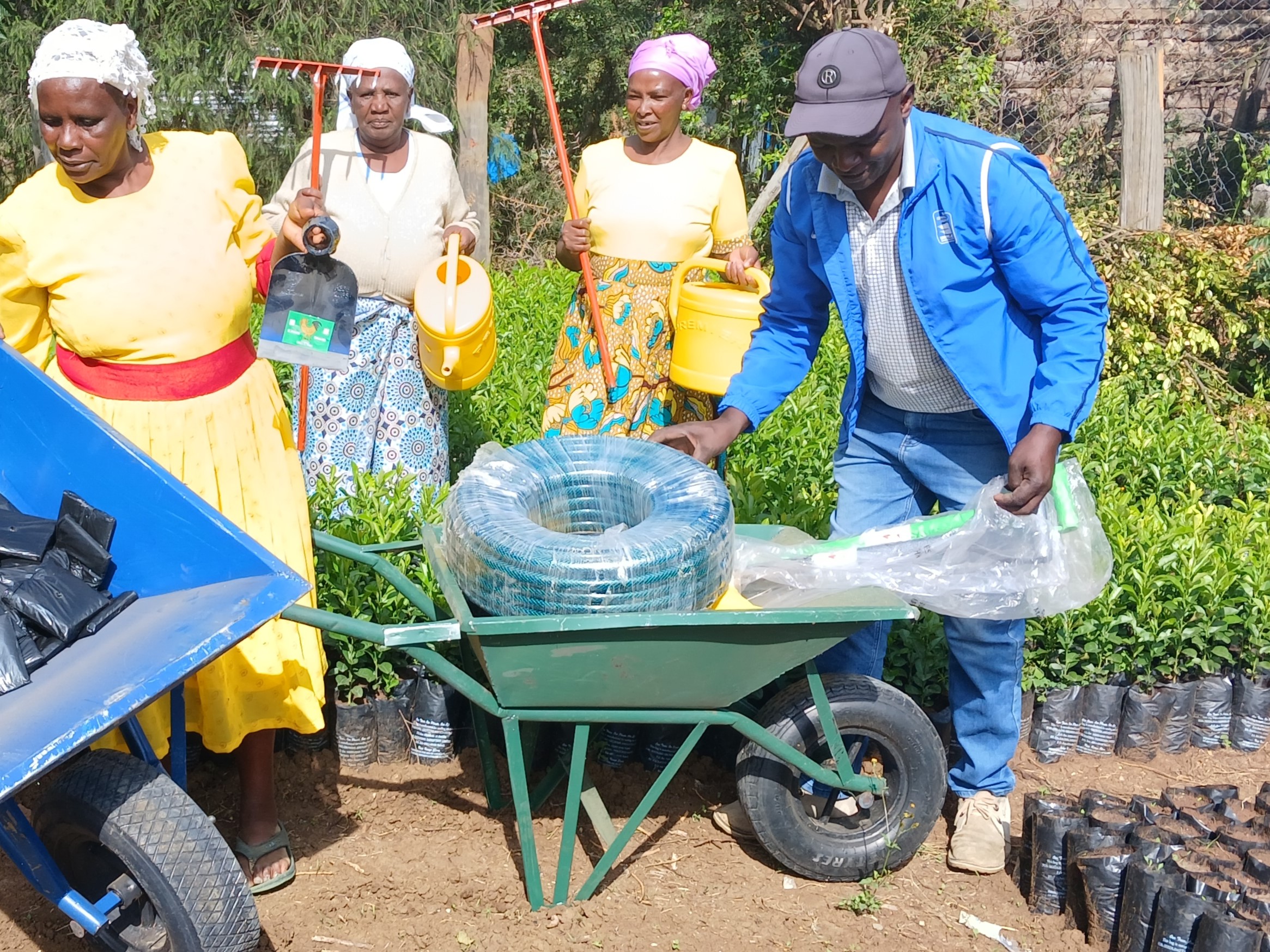Inclusive stewardship of tree nurseries

Mwireri 3, one of the womens groups, receiving tree nusery equipment. Credit - Mount Kenya Trust.
Women at the core of Mount Kenya water catchment forest restoration
Kenya, like many developing nations, has increasingly recognised the vital role women play in socio-economic development. Recent policy shifts and development programmes reflect this understanding, incorporating measures to promote gender equality in education, healthcare, employment, resource allocation, representation, and access to opportunities that empower women and girls. However, women living near protected and biodiversity-rich areas continue to face significant challenges related to environmental, safeguarding, and gender equality, despite their central role in natural resource management and household wellbeing. In the Mount Kenya region, where communities heavily depend on forest resources for their livelihoods, men predominantly lead natural resource management decisions, even though women are the primary resource managers. Women constitute the majority of land workers and are responsible for growing and collecting food, medicines, fuel, and housing materials. In addition, they generate income to support education, healthcare, and other family needs. Conservation efforts in the region have historically been male-dominated, often sidelining women and youth. Culturally, women and youth are frequently considered secondary in matters of resource use and allocation, perpetuating inequalities.
This project, ’Increasing Socio-economic and Ecological Resilience of the Upper Ewaso Ng’iro North Ecosystem’, has created opportunities for women to actively contribute to the restoration of 370 ha of the Mount Kenya forest ecosystem. Besides making strides in the restoration of an essential ecosystem in Kenya, the project demonstrates how conservation initiatives can significantly improve household income and community well-being. Women and girls are playing an increasingly prominent role, challenging entrenched cultural norms that previously hindered their participation. A holistic approach, including community health initiatives, complements these efforts by ensuring women are empowered to thrive alongside their male counterparts.
 Wendo Women Group tending their tree nursery. Credit - MKT.
Wendo Women Group tending their tree nursery. Credit - MKT.
Despite the success and progress in one geographical area, there is still work to be done, and there is still a long way to go as long-standing traditions prohibit women from planting permanent trees, restricting them to seasonal crops, underscoring the need for continued efforts to dismantle such barriers.
Between 2023 and 2025, Mount Kenya Trust (MKT), one of the key implementers of the project, trained 226 women drawn from 20 groups and supported them to produce 240,000 seedlings that have been used to restore the 370 ha earmarked for restoration actions. One example of a women’s group that has benefitted from this project is the Wendo Women Group, a dedicated group of 10 remarkable women who have come together to manage a thriving nursery for tree seedlings. These women have played a crucial role in environmental conservation, particularly during the tree planting season that took place in October and November 2024, when MKT procured a significant quantity of tree seedlings from their nursery.
Esther Kobia is the chair of the Wendo Women Group and serves as the sole breadwinner for her family, which includes four children and seven grandchildren. Under her leadership, the group has successfully cultivated and sold a rich variety of seedlings, earning a substantial profit that has significantly enhanced their livelihoods. Following the distribution of dividends from their sales, Esther made a thoughtful decision to channel her earnings into improving her home. She emotionally remarks, “I am 36 years of age and have no formal job. I do not see myself ever securing any job soon. I have low education as I never completed primary school. I have four children looking up to me for their upkeep and education.”
“We have bought foodstuffs, medication, and even paid fees for our children. Some of us even bought new clothes and other household items.”
Esther says that although previously, she and the other nine women tried their hands in seedling production, no markets easily came by and as such, they hardly made any sales. However, with training from Mount Kenya Trust, the women transformed the seedling production into an income earning enterprise. She goes on to say, “The incomes from purchase of the seedlings paid by MKT have supported us greatly in meeting our household basic needs and restored dignity to us. We have bought foodstuffs, medication, and even paid fees for our children. Some of us even bought new clothes and other household items.”
Esther has taken proactive steps to gather all necessary building materials for the construction of a durable stone house, including sand, timber, and iron sheets. Understanding the importance of food security, Esther has also strategically divided her small farm among her children, ensuring they can grow food for their families' sustenance. This not only provides nourishment but also fosters a sense of responsibility and independence among her children.
Another member is Lilian Gatwiri, a dedicated chair of her women group. Her warm demeanour fosters engaging discussions about the benefits of cultivating tree seedlings. Lilian is a facilitator and a key connector, aiding in translation and documentation for her group's members. As a proud mother, she finds joy in her two children's pursuit of higher education, reflecting her commitment to their futures. Alongside her community work, she manages her farm, growing potatoes and seeking to create a sustainable livelihood. She envisions reinvesting her earnings from seedlings into her business to improve her family’s financial situation. Currently, Lilian is modernising her home by installing electricity and implementing water harvesting equipment for her household and agricultural needs. Her forward-thinking approach highlights her dedication to family sustainability and a brighter future.
As a leader and a direct beneficiary of the one-acre piece of land courtesy of Trees Establishment Livelihood Improvement Scheme (TELIS) programme within a National Forest Reserve, she remarked, “I thank the UK Government for the support given to us. I sincerely thank Fauna & Flora and Mount Kenya Trust for this approach that essentially has enabled me and many other poor women who have for many years had no access to any productive assets especially land in our names. Like many other women, I have children. We have no jobs and for many years we had no land on which to produce any food. We thank this partnership and Kenya Forest Service for not only allowing us access this land to produce potatoes over the next five years, but also for the opportunity to contribute to naturing the tree seedlings planted on our farms. As women and as a sign of our gratitude, we shall ensure the seedlings survive to maturity.”
 Wendo Women Group tree nursery. Credit - MKT.
Wendo Women Group tree nursery. Credit - MKT.
The benefits of the forest restoration project are far from over, as the trees have now been planted through Mount Kenya Trust’s restoration strategy under the TELIS programme. The communities, with a majority being women, will benefit from this scheme. TELIS is a collaborative effort involving the Kenya Forest Service (KFS) and local Community Forest Associations (CFA), designed to achieve dual objectives – habitat reforestation and community benefit.
This innovative agroforestry system employs a strategic approach. Over a span of 4-5 years, communities engage in cultivating crops within earmarked reforestation areas. With plots of around 0.5 to 1 acre, CFA members nurture crops, particularly favouring potatoes, alongside growing tree seedlings. This practice not only safeguards crop but also shields these young trees from wildlife and livestock grazing.
After a successful establishment phase of five years, cultivation ceases. Farmers who have excelled in this endeavour are rewarded with new plots within the National Forest Reserve, demonstrating the programme's long-term commitment to both forest regeneration and community well-being. TELIS exemplifies a harmonious coexistence between sustainable farming and environmental restoration, fostering a resilient ecosystem for generations to come. Through this, each community member is set to make a minimum of 75,000 Kenyan Shilling (GBP 470) per planting season.
Written by Odera George, Josephine Nzilani, and Daisy Owiro. For more information on this Darwin Initiative Extra project DAREX006, led by Flora & Fauna, please click here.

 Back
Back